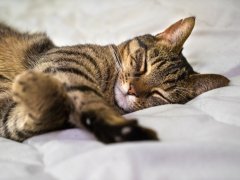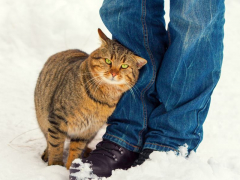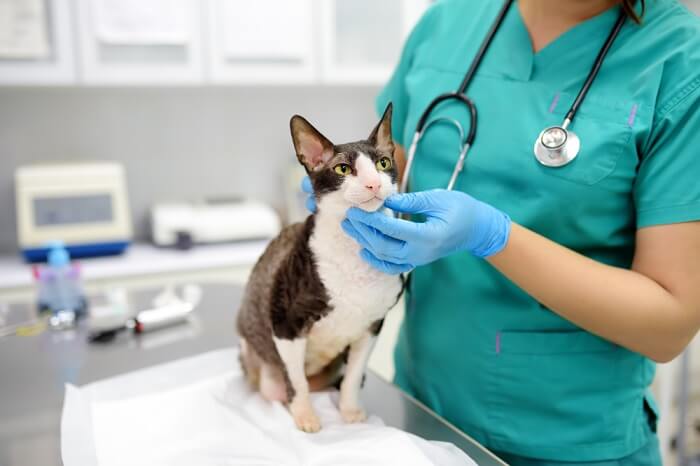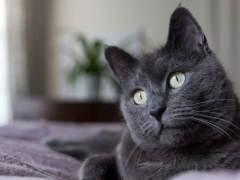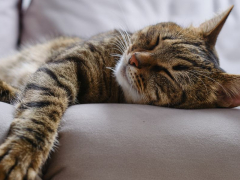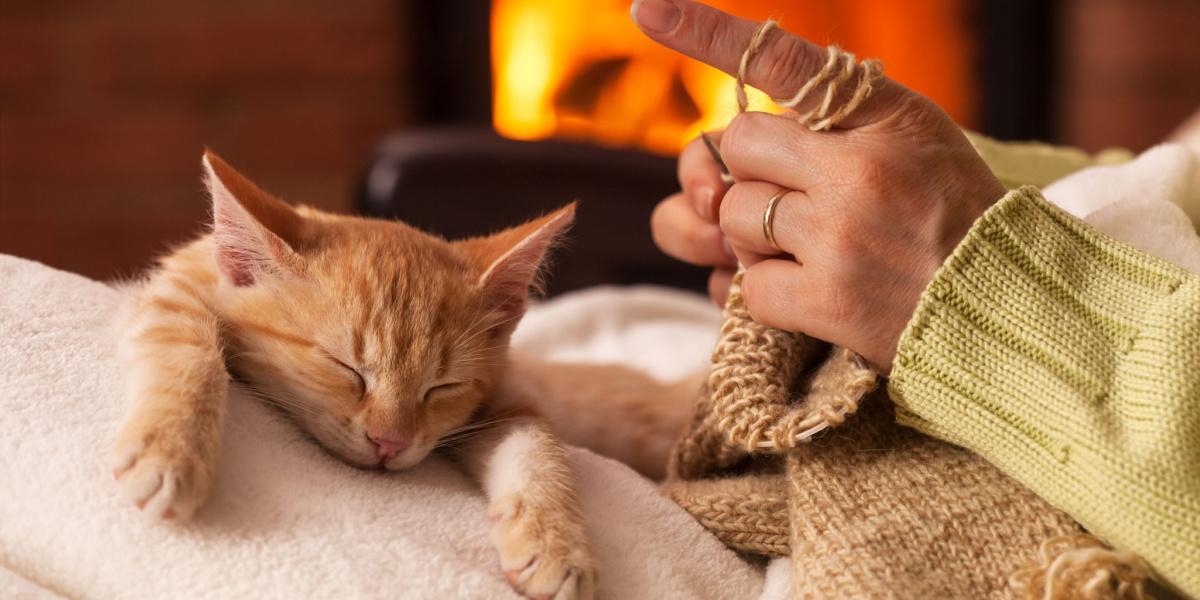
Having your kitty jump up into your lap and settle down for a nap is one of the most comforting and rewarding parts of cat ownership.
Cats like to sit in people's laps for warmth, security, comfort, and affection, and some breeds are particularly known for their cuddly tendencies. Some cats don’t like sitting on laps due to their history, personality, or habits, but there are many other ways to bond with your cat, including grooming, playing, and feeding them. If your cat used to love to lie in your lap but has changed their interaction with you, schedule a vet appointment to rule out pain or illness.Key Takeaways
But why do cats love a bit of lap time? Well, for many of the same reasons that we do, actually! Warmth, companionship, affection, and comfort are all among the most common reasons cats love laps. Having a cuddle with an owner can also be part of a cat’s communication through scent and cat body language.
Top Reasons You Might Have a Lap Cat
Cuddles are great, of course, but let’s delve a little deeper into the many reasons your cat might choose you as their preferred sleeping spot.
1. Comfort
Cats are creatures of comfort, sensitive to textures against their skin and paws, craving softness and snuggles. You may notice that your cat always jumps up onto your lap when you sit with a blanket over you or wear a snuggly garment like a soft bathrobe.
Your lap may well be the perfect size and shape for your cat to get into their favorite sleeping position. They may even knead at your legs, often a sign that a cat is feeling happy and relaxed.
2. Engaging the Senses
Cats have a truly excellent sense of smell, with around 200 million odor receptors, compared to our mere 50 million. They are also very attached to routine and familiarity and like to surround themselves with things that smell, sound, and look comforting and familiar.
If your cat has chosen your lap as a good spot, they will naturally return more and more as they become accustomed to your particular scents, the sound of your breath and heartbeat, and the feel of your clothes.
3. Safety
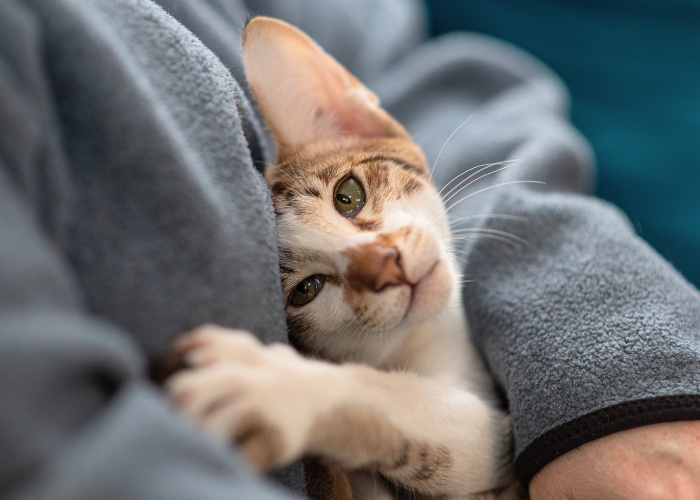
Cats sleep more soundly when they feel safe and protected on your lap.
Cats can be solitary creatures and are at their most vulnerable when sleeping. Innate instincts lead them to seek out the safest spot to sleep in, protected from potential predators and threats.
This is usually a spot that is both up high and away from the ground, warm and comfortable. If they choose your lap to sleep in, this indicates that they feel safe and secure around you, that you are a source of comfort and protection. How lovely!
4. Warmth
Cats have a naturally high body temperature, at around 101 to 102.5 degrees Fahrenheit (a human’s is around 97 to 99 degrees). This heat takes energy to maintain, so cats are highly attracted to warm spaces, which help them more easily maintain their core temperature.
Body temperature tends to drop during sleep, so finding the perfect spot for a warm snooze is highly important, and your lap may just be the best place!
5. Affection
Your cat might wish to spend time with you, lying on you or around you because, quite simply, they love you! Cats cannot communicate their feelings verbally to us (although some of the chattier cat breeds do try), and so they show their affection through a cuddle, a slow blink, and constant companionship. It’s a real compliment!
6. Trust
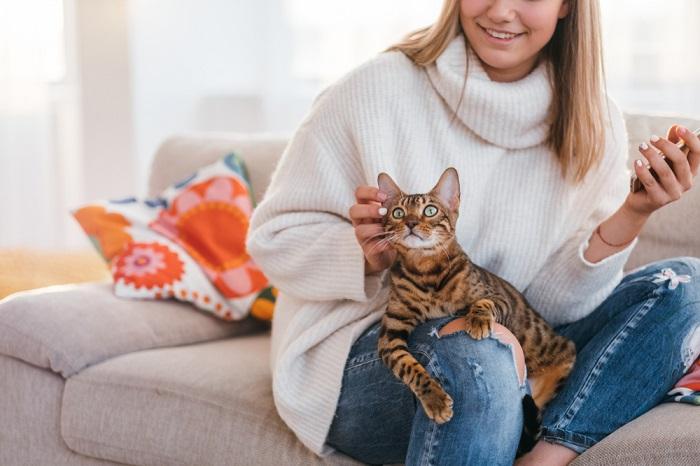
Cats only lie on the laps of people they trust, so know that this is the highest compliment your cat can give you.
Cats are vigilant animals, often taking short catnaps in a light sleep mode with one ear always listening for signs of trouble. When they need a deeper sleep, they seek out a super secure place to fully relax. A kitty who sleeps on you is proving their trust in you, that you have a strong bond that means your cat can fully relax in your presence.
7. Territory
Felines tend to be territorial creatures, using pheromone chemicals from their scent glands to mark out their home turf. They often have a peripheral territory, where they patrol and hunt, and a core territory where they fulfill vital needs such as eating, grooming, and sleeping.
If your cat spends a lot of time around you, including rubbing their face, cheeks, and chin on you, they will be coating you with specific pheromones which communicate safety, comfort, and bonding. The more that this happens, the more integral you become to their core environment, and they will want to spend more and more time in your presence.
8. Breed
All cats have their individual personalities, but some cat breeds are known for their affectionate natures and love of petting and cuddling. The Ragdoll, Sphynx, Siamese, Birman, and Maine Coon are all known for being great lap cats.
Why Does My Cat Sit On My Partner’s Lap but Not Mine?
We’ve just gone through all the lovely reasons why your cat sleeps on a lap, so you’d be forgiven for feeling a bit miffed if your cat sleeps on someone else’s lap and not yours. But don’t take it personally!
Cats are creatures of habit, and once they’ve decided that a lap is right for them, for whatever reason, they’ll stick to it—even if yours is just as cozy. A cat’s sensitivity to smell means they may have strong preferences for certain scents, and once they start sleeping on a lap, they’ll then add their scent each time, so the bond just gets stronger.
Pet cats often bond more strongly to one person in the household than others. This can be especially true if there is more than one pet in the household and a complex social structure is in place.
Why Is My Cat Not a Lap Cat?
All cats are individuals, with their own personalities, temperament, likes, and dislikes. Some cats just don’t want to sleep in laps, they prefer their own space. In some, there is a reason for a preference for solitude. Kittens who have had poor socialization may shy away from human contact, even as mature cats.
Cats who have been adopted from an animal shelter, especially those who have been in shelters for a significant time, might find it hard to trust a person enough to sleep on them, although this could come with time and patience.
If your cat used to love a snuggle but now shies away from contact, hides away, or has generally changed their interaction with you, this may be cause for concern. A vet appointment to rule out pain or illness should always be a first step if anything about your cat’s behavior changes.
Other causes may be any stress or anxiety, such as a house move, a new pet or baby in the house, or a new cat in the neighborhood. A consultation with a cat behavior expert can help you learn the best way to support your pet through this.
Can I Persuade My Cat To Sit On My Lap?
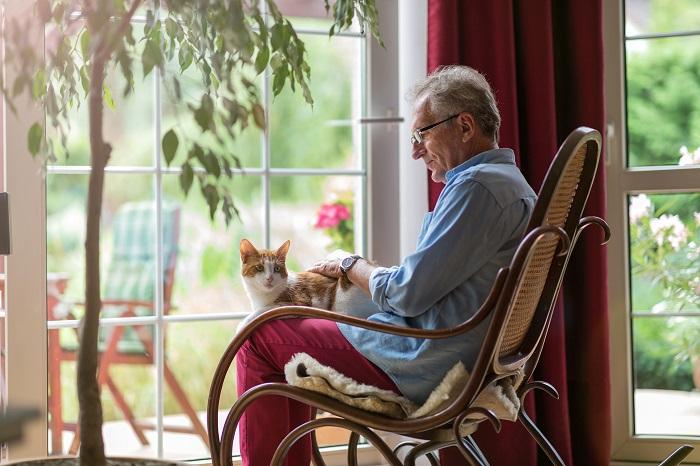
If your cat doesn’t naturally like sitting on laps, you can try to coax them with gentle petting and treat rewards.
Some cats just don’t like sitting on laps, due to their history, personality, or habits, and this should be respected. There are lots of other ways to bond with your cat, including grooming, playing, and feeding them. Focus on growing and maintaining and strong bond with your cat, and they may well start turning to you for more affection.
If you think your cat would enjoy a gentle petting on your lap but just hasn’t figured it out yet, introduce the idea very slowly, with lots of treats and positive reinforcement. Start by sitting near your cat, giving gentle strokes, and using plenty of rewards to ensure it is a positive and repeatable experience.
Slowly build up until your cat is comfortable sleeping next to you, and then you can try gently placing them on your lap. It is always best to let your cat approach you, ideally. This approach needs plenty of time and patience. Forcing your cat to sit with you, or being overly enthusiastic about your affection will likely just result in a pet who is wary of approaching you.
Also Read: Why Isn’t My Cat Affectionate?
Final Thoughts
A lot of cats love laps and a lot of cat owners love a cuddle—a match made in heaven! Cats like to sit in a lap for warmth, security, comfort, and affection, and some breeds are particularly known for their snuggly natures. If your cat isn’t the type for a lap cuddle, don’t despair – there are loads of other ways you can bond with them.
Also Read: Why Do Cats Sit On Squares?
Frequently Asked Questions
Why do cats sit on your laps?
Cats often love to sit on a lap, and often this is for comfort, companionship, and affection. It might also be for warmth and safety, and because you smell comfortingly like their home territory.
Why do cats like to sleep on people’s laps?
Cats are vulnerable during sleep, and so they choose a safe, warm place to sleep where they are up high away from predators and in a position of trust. If your cat sleeps on your lap, it’s a compliment that they feel secure and relaxed around you, and they enjoy a cozy cuddle.
Does a cat trust you if it sleeps next to you?
Cats often choose a warm place to sleep, to combat a drop in body temperature. They are also vulnerable to predators when asleep, so they make sure to pick a secure place. A cat sleeping near you shows that they trust you and feel safe with you.


